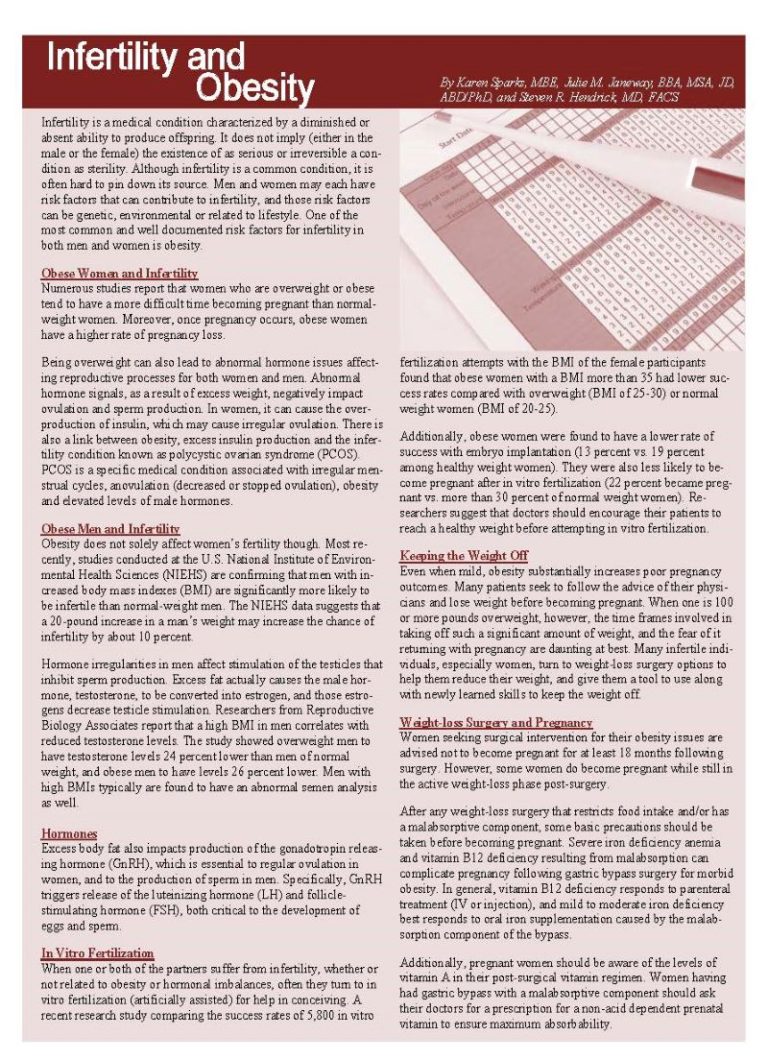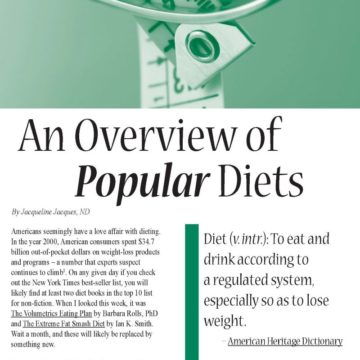Infertility and Obesity


By Karen Sparks, MBE, Julie Janeway, BBA, MSA, JD, ABD/PhD and Steven R. Hendrick, MD, FACS
Spring 2007
Infertility is a medical condition characterized by a diminished or absent ability to produce offspring. It does not imply (either in the male or the female) the existence of as serious or irreversible a condition as sterility. Although infertility is a common condition, it is often hard to pin down its source. Men and women may each have risk factors that can contribute to infertility, and those risk factors can be genetic, environmental or related to lifestyle. One of the most common and well-documented risk factors for infertility in both men and women is obesity.
Women with Obesity and Infertility
Numerous studies report that women who have excess weight or obesity tend to have a more difficult time becoming pregnant than normal-weight women. Moreover, once pregnancy occurs, women with obesity have a higher rate of pregnancy loss.
Being overweight can also lead to abnormal hormone issues affecting reproductive processes for both women and men. Abnormal hormone signals, as a result of excess weight, negatively impact ovulation and sperm production. In women, it can cause the overproduction of insulin, which may cause irregular ovulation. There is also a link between obesity, excess insulin production and the infertility condition known as polycystic ovarian syndrome (PCOS). PCOS is a specific medical condition associated with irregular menstrual cycles, anovulation (decreased or stopped ovulation), obesity and elevated levels of male hormones.
Men with Obesity and Infertility
Obesity does not solely affect women’s fertility though. Most recently, studies conducted at the U.S. National Institute of Environmental Health Sciences (NIEHS) are confirming that men with increased body mass indexes (BMI) are significantly more likely to be infertile than normal-weight men. The NIEHS data suggests that a 20-pound increase in a man’s weight may increase the chance of infertility by about 10 percent.
Hormone irregularities in men affect stimulation of the testicles that inhibit sperm production. Excess fat actually causes the male hormone, testosterone, to be converted into estrogen, and those estrogens decrease testicle stimulation. Researchers from Reproductive Biology Associates report that a high BMI in men correlates with reduced testosterone levels. The study showed overweight men to have testosterone levels 24 percent lower than men of normal weight, and men with obesity to have levels 26 percent lower. Men with high BMIs typically are found to have an abnormal semen analysis as well.
Hormones
Excess body fat also impacts production of the gonadotropin releasing hormone (GnRH), which is essential to regular ovulation in women, and to the production of sperm in men. Specifically, GnRH triggers release of the luteinizing hormone (LH) and follicle-stimulating hormone (FSH), both critical to the development of eggs and sperm.
In Vitro Fertilization
When one or both of the partners suffer from infertility, whether or not related to obesity or hormonal imbalances, often they turn to in vitro fertilization (artificially assisted) for help in conceiving. A recent research study comparing the success rates of 5,800 in vitro fertilization attempts with the BMI of the female participants found that women with obesity with a BMI more than 35 had lower success rates compared with overweight (BMI of 25-30) or normal weight women (BMI of 20-25).
Additionally, women with obesity were found to have a lower rate of success with embryo implantation (13 percent vs. 19 percent among healthy weight women). They were also less likely to become pregnant after in vitrofertilization (22 percent became pregnant vs. more than 30 percent of normal weight women). Researchers suggest that doctors should encourage their patients to reach a healthy weight before attempting in vitro fertilization.
Keeping the Weight Off
Even when mild, obesity substantially increases poor pregnancy outcomes. Many patients seek to follow the advice of their physicians and lose weight before becoming pregnant. When one is 100 or more pounds overweight, however, the time frames involved in taking off such a significant amount of weight, and the fear of it returning with pregnancy are daunting at best. Many infertile individuals, especially women, turn to weight-loss surgery options to help them reduce their weight, and give them a tool to use along with newly learned skills to keep the weight off.
Weight-loss Surgery and Pregnancy
Women seeking surgical intervention for their obesity issues are advised not to become pregnant for at least 18 months following surgery. However, some women do become pregnant while still in the active weight-loss phase post-surgery.
After any weight-loss surgery that restricts food intake and/or has a malabsorptive component, some basic precautions should be taken before becoming pregnant. Severe iron deficiency anemia and vitamin B12 deficiency resulting from malabsorption can complicate pregnancy following gastric bypass surgery for morbid obesity. In general, vitamin B12 deficiency responds to parenteral treatment (IV or injection), and mild to moderate iron deficiency best responds to oral iron supplementation caused by the malabsorption component of the bypass.
Additionally, pregnant women should be aware of the levels of vitamin A in their post-surgical vitamin regimen. Women having had gastric bypass with a malabsorptive component should ask their doctors for a prescription for a non-acid dependent prenatal vitamin to ensure maximum absorbability.
While pregnancy is not recommended during the period of rapid weight-loss in the initial post-operative period, it can be managed effectively with the assistance of both the bariatric surgeon and OB/GYN who specializes in high risk pregnancies. Data indicates that a pregnancy which develops after the period of rapid postoperative weight-loss also shows that neither the mother nor the developing fetus is unduly endangered if appropriate precautions, monitoring and nutritional care are provided.
Conclusion
Obesity is a major health issue associated with infertility and many other co-morbid conditions. Studies show weight-loss is extremely valuable in the management of such patients, can enhance fertility, and lead to successful full term pregnancies.
About the Authors:
Steven R. Hendrick, MD, FACS, is a bariatric surgeon with Henry Ford Health System in Michigan. His practice is an international bariatric surgery center serving the pre-operative, surgical, and post-operative / follow-up care needs of patients in both countries. He is a Board Certified general surgeon with an extensive practice in bariatric surgery. He has performed hundreds of bariatric surgeries with outcomes better than the national average, and is a caring and dedicated physician committed to making sure his patients are successful in this life changing endeavor.
Julie M. Janeway, BBA, MSA, JD, ABD/PhD, is a gastric bypass patient having had surgery in October, 2003. She is the co-author of the best-selling book “The REAL Skinny on Weight Loss Surgery: An Indispensable Guide to What You Can REALLY Expect.” She is the co-owner of the Little Victories™ family of companies serving bariatric patients and medical professionals. Julie is a professor at Central Michigan University, is a former Michigan trial attorney and is a member of the OAC National Board of Directors.
Karen Sparks, MBE, is a gastric bypass patient having had surgery in December 2003. She is a former Dean of Business Administration and Technology at Baker College, and has been teaching for 15 years in business and technology. She is the co-owner of Little Victories Press and Little Victories Support Specialists serving both bariatric patients and medical professionals and the co-author of “The Real Skinny on Weight Loss Surgery: An Indispensable Guide to What You Can REALLY Expect!” She is a member of the OAC Advisory Board.
Sources:
1. Bianco AT, Smilen SW, Davis Y, Lopez S, Lapinski R, Lockwood CJ. Pregnancy outcome and weight gain recommendations for the morbidly obese woman. Obstet Gynecol 1998, Jan; 91(1): 97-102.
2. Printen KJ, Scott D.Pregnancy following gastric bypass for the treatment of obesity. Am Surg 1982 Aug; 48(8): 363-5.
3. Wittgrove AC, Jester L, Wittgrove P, Clar GW. Pregnancy following gastric bypass for morbid obesity. Obes Surg 1998 Aug ;8(4): 461-4; discussion 456-6.
4. Gurewitsch ED, Smith-Levitin M, Mack J.Pregnancy following gastric bypass surgery for morbid obesity. Obstet Gynecolo 1996 Oct; 88(Pt 2): 658-61.
5. Garcia, C., MD. Part 2 of a series for MSNBC “Today,” Can weight impact your ability to get pregnant? Fat and fertility, and how you can improve your odds for baby success. Oct 24, 2006. www.msnbc.msn.com/id/15391084
6. Sallmen, M, Sandler, D., Hoppin, J, Blair A., Baird, D. Reduced fertility among overweight and obese men. Epidemiology 2006 Sept: 17(5). (NIEHS study).
7. Buffington, Cynthia K.Pregnancy risks before and after bariatric surgery.www.BariMD.com.
8. NEFI, New England Fertility Institute, 1275 Summer Street, Suite 201, Stamford, CT 06905.
9. Highlights from the Conjoint Meeting of the American Society for Reproductive Medicine and the Canadian Fertility and Andrology Society. Sperm Impacts: Environmental Factors, Lifestyle, and Medications Affect male Fertility. (Atlanta Reproductive Biology Associates study).
10. Ryley, S. Influence of body mass index (BMI) on the outcome of 6,827 IVF cycles.Presented at the annual meeting of the American Society of Reproductive Medicine, Philadelphia, Oct. 16-20, 2004.
by Kendall Griffey, OAC Communications Manager Spring 2024 We have officially kicked off Your Weight Matters Regional…
Read Articleby Nina Crowley, PhD, RD (with Inspiration from Shawn Cochran) Winter 2024 Dating, no matter your age,…
Read Articleby Leslie M. Golden, MD, MPH, ABOM Diplomate Winter 2024 The journey to overcoming obesity is a…
Read Article









